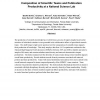Free Online Productivity Tools
i2Speak
i2Symbol
i2OCR
iTex2Img
iWeb2Print
iWeb2Shot
i2Type
iPdf2Split
iPdf2Merge
i2Bopomofo
i2Arabic
i2Style
i2Image
i2PDF
iLatex2Rtf
Sci2ools
139
click to vote
JASIS
2011
2011
Composition of scientific teams and publication productivity at a national science lab
The production of scientific knowledge has evolved from a process of inquiry largely based on the activities of individual scientists to one grounded in the collaborative efforts of specialized research teams. This shift brings to light a new question: how the composition of scientific teams impacts their production of knowledge. This study employs data from 1,415 experiments conducted at the National High Magnetic Field Laboratory (NHMFL) between 2005 and 2008 to identify and select a sample of 89 teams, and examine whether team diversity and network characteristics impact productivity. The study examines how the diversity of science teams along several variables impacts overall team productivity. Results indicate several diversity measures associated with network position and team productivity. Teams with mixed institutional associations were more central to the overall network compared to teams composed primarily of the NHMFL’s own scientists. Team cohesion was positively related...
JASIS 2011 | Productivity | Team Productivity | Teams |
| Added | 14 May 2011 |
| Updated | 14 May 2011 |
| Type | Journal |
| Year | 2011 |
| Where | JASIS |
| Authors | Besiki Stvilia, Charles C. Hinnant, Katy Schindler, Adam Worrall, Gary Burnett, Kathleen Burnett, Michelle M. Kazmer, Paul F. Marty |
Comments (0)

